“Lifestyle” has become one of the hottest marketing buzzwords in Japan in recent times and everywhere you look these days you will see someone describing either themselves or their goods and services as “lifestyle this” or “lifestyle that.” The current pervasiveness of this concept suggests it is a relatively new and revolutionary idea, and yet this couldn’t be further from the truth. James Sycamore speaks to a renowned restaurant producer who has been preaching the lifestyle mantra for the past 30 years.
For someone approaching their 50th birthday, Alain Ducasse is showing few signs of slowing down.
The renowned French chef’s days of slaving away in front of a hot stove may be long gone, but his global reach continues to expand. Groupe Alain Ducasse, which includes restaurants, inns, cooking schools, printed media and consulting activities in various locations around the world.
Believing Ducasse to be more of a chef d’entreprise than a chef de cuisine these days, I was surprised as the next man when he strolled unannounced into the kitchen of his fine dining establishment in Ginza at nine o’clock in the morning to ensure the prep chefs were well into their work. Although the sight of an immaculately dressed man walking around the kitchen wearing a tailored suit at that hour of the day looked a little out of place, Ducasse looked as though he was right at home.
And, indeed, the master chef with nine Michelin stars to his name has every reason to feel this way. Beige Tokyo, which opened in December 2004, represents Ducasse’s first foray into the Japanese market and if initial reports are anything to go by it has proven to be an unqualified success. The enormous public interest in this elegant establishment, located at the apex of the ultra-modish Chanel Building in Ginza, convinced Ducasse to open a second eatery in Tokyo last year. Situated in the heart of the vibrant district of Aoyama, Benoit offers a typical French restaurant cuisine with a café space in an atmosphere that is decidedly more casual that its not-so-distant Ginza cousin but by no means less enjoyable.
Even though the success of these establishments is virtually assured, Ducasse is certainly not one to sit back and rest on his laurels. In November 2003, Alain Ducasse Formation (ADF), a training center that teaches “next generation” cooking, delivered its first training courses to Japanese catering professionals in collaboration with Tsuji Culinary Institute Group. The celebrated chef is a firm believer in passing his knowledge on to a whole new audience, whether they are industry experts or members of the public who are merely interested in gastronomy (as taught in his L’École de cuisine d’Alain Ducasse).
In fact, it seems almost impossible to predict a time when Ducasse will be content to take a step back and draw a line under his activities in Tokyo. In November this year, the group is expected to launch a new bakery and grocery store in Tokyo called be boulangépicier (“b” stands for the first letter of boulangerie (a traditional bakery) and “e” for épicerie (a local grocer)) that is modeled on his formative outlet in Paris. With plans like these afoot, it appears unlikely Ducasse is going to take his foot off the gas any time soon.
“One of the goals of Groupe Alain Ducasse is that we want to become more and more excellent with each passing day,” he says as he sits with me at a small table in the main dining room of Beige Tokyo, having made sure everything was in order in the kitchen for the day’s covers. Although myriad commitments have not allowed him to spend a great deal of time in Tokyo since opening day, again he appears perfectly at ease in the Peter Marino-designed interior. One gets the feeling he could probably find his way down to the lobby from his present position blindfolded. “What we do today, we can do better tomorrow. It’s an ongoing commitment.”
Although he acknowledges his projects are solidly grounded in the hospitality industry, Ducasse believes his work should be looked at in a much wider context.
“The origin of the group is based on cuisine, but I like to think we have moved beyond this,” he says. “I want to create a new lifestyle for people to enjoy. I hope that people can feel moved by all aspects of life.”
One of the most important ingredients behind Ducasse’s success is his willingness to work with other people on particular projects. Take his collaboration with Chanel to set up Beige Tokyo, for example, or his ongoing dealings with Tsuji Culinary Institute to organize training courses for catering professionals.
“Each time we get involved in a project, we choose a partner that is grounded on a solid relationship,” he says. “It’s not just a matter of money. It takes a little more time to do this in Japan [compared to Europe] but the results are certainly worth it.”
Ducasse says he was initially attracted to Japan because of the “give-and-take culture” of Japanese society.
“Japanese are very open to new things and can accept new proposals, and vice versa,” he says. “This permanent cultural exchange is very exciting and it’s one of the biggest reasons behind my coming here. There seems to be a deep understanding with what I’m trying to do.”
But setting up shop in this country is not as easy as un, deux, trios, and it took Groupe Alain Ducasse more than four-and-a-half years to get its Japan operations up and running.
“As a restaurant creator, I try to create places that are in harmony with the specific environment in each location,” he says. “Each restaurant proposal is different from one country to another. I try to ensure I understand the local people before I move into any one area. It takes a minimum of two years to learn all the intricacies of an area and adapt our way of thinking accordingly.”
He adds, however, that this preparatory work is unavoidable if the project is to be successful or not in the long run.
“Preparation is important,” he says. “The initial work is essential to the ultimate success of the enterprise. It’s important to understand the specific local conditions. After opening, we might discover that certain ideas need to be revised, but we always try to remain true to our initial goal.”
Natural Selection
Ducasse was born on September 13, 1956, on a small farm in Castelsarrazin in the Landes region of southwestern France. This formative rural environment taught him a lot about the origin of food.
“I first became passionate about cuisine around the age of 12 as a result of weekend visits to my grandmother’s house in the French countryside, when she would cook food for my family,” he says with a wistful look in his eye. “My childhood memories form the base of my cooking today. They were and still are a significant influence and, in fact, everything I do today is in some way connected to my memories of cooking as a child. Most importantly, I learnt to like what is excellent.”
Ducasse cut his teeth in the kitchen at the Pavillon Landais restaurant in Soustons as a 16-year-old apprentice in 1972 before working at Michel Guérard’s restaurant in Eugénie-les-Bains and then Moulin de Mougins. It was in the latter establishment that he learnt the Provencal cooking methods for which he would later become famous.
His first position as chef came in 1980 when he took over the kitchens at L’Amandier in Eugéne Mougin. One year later, he became head chef at La Terrasse in the Hotel Juana in Juan-les-Pins.
In 1987, he was offered the chef des cuisines position at the Hotel de Paris in Monte Carlo, with management including the hotel’s high-end Le Louis XV restaurant. After three years, Louis XV became the first hotel restaurant in the world to be awarded three stars in the Red Guide. At the time, Ducasse was only 33 years old, one of the youngest chefs in Michelin’s history.
In 1995, Ducasse expanded beyond the restaurant industry and opened La Bastide de Moustiers, a 12-bedroom country inn located in Provence and he began attaining financial interests in other Provence hotels. In 1996, the Alain Ducasse restaurant opened in Le Parc – Sofitel Demeure Hotels in Paris, France. The Red Guide awarded the restaurant three stars just eight months after opening.
He decided to try his luck in the United States and in June 2000 opened the Alain Ducasse restaurant in the New York City Essex House, which received the Red Guide’s three stars in December 2005. He is currently the only chef within the Michelin Guide to hold three stars in three different countries.
Although Ducasse acknowledges that passion and dedication are important attributes in most respected chefs, he puts his own success down to his uncanny ability to keep his mind open.
“Cuisine is in a state of permanent evolution and a good chef must know what trends are popular all around the world,” he says. “A good chef should be curious all the time.”
That said, however, Ducasse is quick to downplay suggestions he is a spotlight-hogging show-off.
“My cuisine is a combination of product and skill,” he says. “Perfect products are married with very precise, technical skills to create something I hope people will enjoy. Nothing more, nothing less.”
Sharing Beats the Pirates
As the interview progresses and the background activity in the main dining room increases as the staff arrive to prepare the tables for lunch, Ducasse becomes more and more animated when asked to comment on the group’s underlying philosophy.
“Group Alain Ducasse aims to do things seriously without ever being too serious,” he says. “We are not motivated solely by profit and how a job is carried out is equally as important as whether or not we make any money at the end of the day. We are open to new challenges and new ideas for the better of the company as a whole.”
Sharing is an important part of the process, he says, and he frowns on those who hoard information in fear of replication.
“I have tried to act as a conduit of information for more than 20 years now,” he says. “I believe it’s an important part of life in general. We do not hide anything. But again it’s a give-and-take philosophy. People come from all over the world to study in my cooking schools, and during that time they learn how to make our recipes. At the same time, we are influenced by our students and their own unique culture. We influence them, they influence us, and so we always have this permanent evolution of knowledge.”
This, he believes, lies at the heart of the whole notion of “lifestyle.”
“It’s a way of being,” he says. “It’s more than a way of life; it’s a matter of survival. One should be always open to new ideas and communicate openly with people. One should always exchange ideas and collaborate, not try and prove you are better than the rest. Once people learn to let go of their competitive streak and communicate with others, everyone benefits.
“This way, the dynamic of a group grows over time. It’s a permanent exchange between new things and traditional things. It’s ongoing. By passing on my knowledge, I can also improve myself. Once someone gives, they allow themselves to be an equal to the person receiving the information. If you both share the same knowledge, then you are on equal terms and no-one is any better than anyone else.”
So what does Ducasse himself believe is important in life?
“I would like to ensure the people working in my group are happy in their personal life and their professional life,” he says. “To be happy in both lives – in one life – is important for their well-being. If the company is happy and the people working inside are happy, then the customer is happy. It’s a kind of synergy.
“I believe everyone should live independently of each other but live the same life because, after all, this life is what we all live.”
Story by James Sycamore
From J SELECT Magazine, September 2006

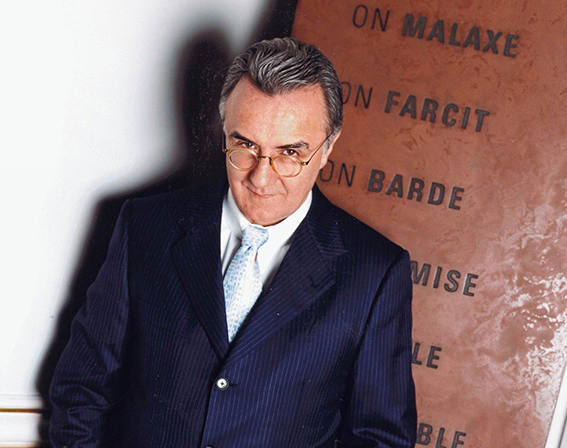


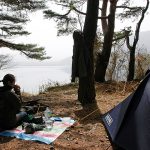
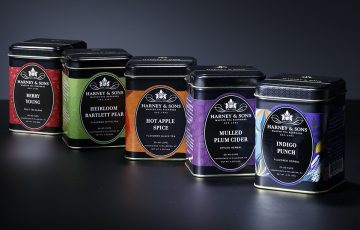

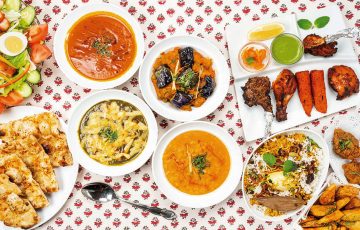
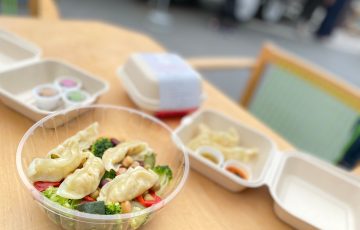

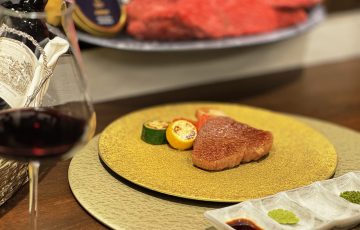
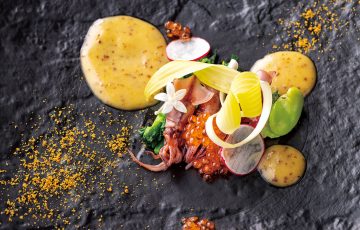
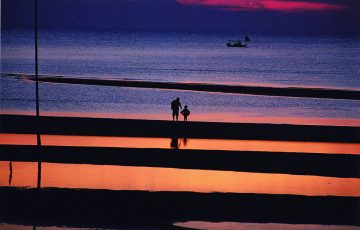


Recent Comments